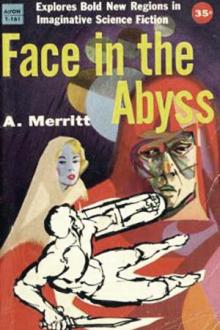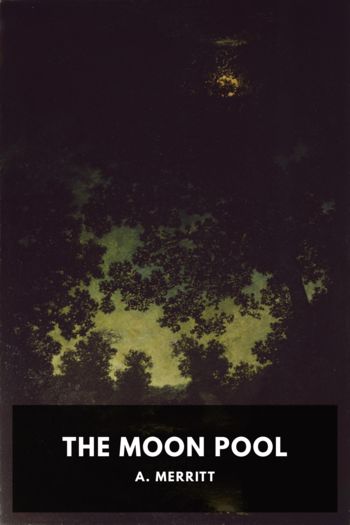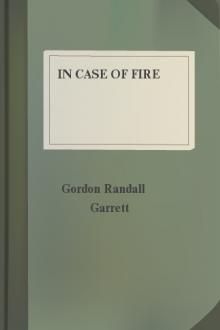The Face in the Abyss - Abraham Merritt (romance novel chinese novels .txt) 📗

- Author: Abraham Merritt
- Performer: -
Book online «The Face in the Abyss - Abraham Merritt (romance novel chinese novels .txt) 📗». Author Abraham Merritt
Graydon followed the Indians. As he passed the red throne he saw a figure within it—a shrunken figure all in tasseled robe of red and yellow.
The Lord of Folly! He had not seen him enter. How long had he been there? He paused. The Lord of Folly looked at him with twinkling, youthful eyes. He reached out a long white hand and touched him on the forehead. At the touch, Graydon felt all perplexities leave him; in their place was a careless gayety, a comfortable feeling that, despite appearances, things were perfectly all right in a world that seemed perfectly all wrong. He laughed back into the twinkling eyes.
“Welcome—son!” chuckled the Lord of Folly.
One of the Indians touched him upon the arm. When he looked back at the red throne, it was empty.
He followed the Indians through the portal. They led him to a room, dimly lighted, cob-web curtained, a wide couch in its center. There was a small ivory table on which were
bread and fruit and a pale mild wine. As he ate, the Indians took from him his suit-of-mail, and stripped him to the skin. They brought in a basin of crystal, bathed him, and massaged him and rubbed him with oil. They drew a silken robe around him, and put him to bed.
“‘Welcome—son!’” muttered Graydon, sleepily. “Son? Now what did he mean by that?”
Still wondering, he went sound asleep.
CHAPTER XX. Wisdom of the Serpent Mother
IT WAS MID-MORNING of the next day when an Emer came to Graydon with a summons from the Snake Mother. He had awakened to find Regor and Huon watching him from the doorway. Regor still wore his black, but Huon had traded the yellow of the Fellowship for the Serpentwoman’s blue. As he arose, he found on a settle beside his bed a similar costume. He put on the long, loose blouse, the hose and the heelless, half-length boots of soft leather. They fitted him so well that he wondered whether some one had come in during the night and had measured him.
There was a circlet of gold upon the settle, but he let it be. After a moment’s hesitation he thrust his automatic into the inner fold of his wide girdle. A blue silken cloak, fastened at the shoulders with loops of gold, completed his dress. He felt rather self-conscious in it, as though he were going to a costume party—something he had always loathed; but there was nothing else to wear, his suit-of-mail had vanished, and his other clothing was in the ravished lair.
He breakfasted with the pair. Huon, he saw, was taking matters badly, his beauty grown haggard, his eyes unhappy. Also, much of Regor’s buoyancy had fled, whether through sympathy for Huon or for some other reason he did not know. Neither of them made slightest reference to his fight with Lantlu, and that aroused in him a piqued curiosity. Once he had led the talk close to it; Huon had glanced at him with a flash of irritated distaste; Regor had given him an admonitory kick under the table. ;
He did not find it a pleasant meal, but he had been en-. lightened as to Huon’s manner. Regor and Huon had started;
to go out. Graydon would have accompanied them, but the giant told him gruffly that he would better stay where he
was, that the Mother was sure to send for him, that she had turned over all her soldiery to Huon and himself and that
they would be busy drilling them. In a few moments he returned, alone.
“You did well, lad,” he grumbled, slapping Graydon’s shoulder. “Don’t mind Huon. You see, we don’t fight each other in just the way you did. It’s the way of the Urd. I tell Huon that you’re not supposed to know our customs but— well, he didn’t like it. Besides, he’s heartbroken about the Fellowship and Dorina.”
“You can tell Huon to go to hell with his customs,” Graydon was hurt and angry. “When it comes to a brute like Lantlu, I fight tooth and nail, and no hold barred. But I see why Lantlu beat him. He was on the job while Huon, probably, was considering how to say it to him with flowers!”
“Much of that was in your own tongue,” grinned Regor, “but I get your meaning. You may be right—but Huon is
Huon. Don’t worry. He’ll be over it when you meet him
again.”
“I don’t give a damn whether he is or not—” began Graydon, furiously. Regor gave him another friendly slap, and walked out
Still hotly indignant, Graydon dropped upon a settle and prepared to await the expected summons. The walls of the room were covered with the filmy curtains, dropping from ceiling to floor. He got up and walked around them, feeling through the webs. At one spot, his hand encountered no resistance. He parted them and stepped into another room, flooded with clear daylight from a balconied window. He walked out on the balcony. Beneath him lay YuAtlanchi.
The Temple was high above the city, the ground falling away from it in a gentle slope. Between it and the lake the slope was like a meadow, free of all trees, and blue as though carpeted with harebells. And the opposite side of the lake was nearer then he had judged, less than a mile away.
He could see the spume of the cataract, torn into tattered banners by the wind. The caverns of the colossi were like immense eyes in the brown face of the precipice. The figure of the Frogwoman was plain, the green stone of which she was carved standing out in relief against the ochreous rock.
And there was the white, exquisite shape which guarded the cavern of the dead.
There was another colossus, cut, it seemed, from rosequartz, shrouded to the feet, its face hidden behind an uplifted arm; and there was a Cyclopean statue of one of the gray and hairless ape-men. These stood out clearly, the outlines of the other he could not distinguish for their color merged into that of the cliffs.
At his left, the meadow changed to a level plain, sparsely wooded, running for miles into the first wave of the forest, and checkered by the little farms of the Indians. At his right was the ancient city and, now seen so closely, less like a city than a park.
Where the city halted at the edge of the Temple’s flowering mead, and halfway to the lake, was a singular structure. It was shaped like an enormous shell whose base had been
buried to hold it upright; its sides curved gracefully, drawing closer in two broad, descending arcs, then flaring out to
form an entrance. It faced the Temple, and from where he stood Graydon could see practically all of the interior.
This shell-like building was made of some opaline stone. Here and there within it glowed patches of peacock fires of the Mexican opal’s matrix, and here and there were starry points of blue like those which shine from the black opal. The reflected rays from them appeared to meet in the center of the structure, stretching across it like a nebulous curtain. And, like a shell, its surface was fluted. The grooves were cut across, two-thirds from the top, by tier upon tier of stoneseats. Its top was all of three hundred feet high, its length per-. haps thrice that. He wondered what could be its use.
He looked again over the city. If Lantlu were preparing an attack, there was no evidence of it. Along the broad avenues
skirting the lake was tranquil movement, Indians going about their businesses, the glint of jeweled litters borne on the shoulders of others; a small fleet of boats with gayly colored sails and resembling feluccas skimmed over the water. There was no marching of armed men, no sign of excitement. He watched laden llamas swinging along, and smaller deer-like animals, grazing. The flowering trees and shrubs hid the lanes threading the grounds of the palaces. I
Then he had been summoned to the Serpentwoman. Graydon followed the messenger. They paused before a
curtained recess; the Indian touched a golden bell set in the
wall. The hangings parted.
He was on the threshold of a roomy chamber, through whose high, oval windows the sunlight streamed. Tapestries covered its walls, woven with scenes from the life of the serpentpeople. Upon a low dais, her coils curled within a nest of cushions, was the Snake Mother. Behind her was Suarra, brushing her hair. The sun made round it a halo of silver. At her side squatted the Lord of Folly in his cloak of red and yellow. Suarra’s eyes brightened as he entered, dwelling upon him tenderly. He made obeisance to Adana, bowed low to the Lord in motley.
“You look well in my blue, Graydon,” lisped the Serpentwoman. “You haven’t the beauty of the Old Race, naturally. But Suarra doesn’t mind that,” she glanced slyly at the girl.
“I think him very beautiful,” said Suarra, quite shamelessly.
“Well, I myself find him interesting,” trilled Adana, “after all these centuries, the men of YuAtlanchi have become a bit monotonous. Come and sit beside me, child,” she motioned toward a long, low coffer close to her. “Take a pillow or two and be comfortable. Now tell me about your world. Don’t bother about your wars or gods—they’ve been the same for a hundred thousand years. Tell me how you live, how you amuse yourselves, what your cities are like, how you get about, what you have learned.”
Graydon felt this to be a rather large order, but he did his best. He ended almost an hour later, feeling that he had made a frightful jumble of skyscrapers and motion pictures, railroads and steamships, hospitals, radios, electricity and airplanes, newspapers and television, astronomy, art and telephones, germs, high-explosives and arc lights, he tripped on the electronic theory, bogged hopelessly on relativity, gulped and wiped a wet forehead. Also he had been unable to find Aymara words to describe many things, and had been forced to use the English terms.
But Adana had seemed to follow him easily, interrupting him seldom, and then only with extremely pointed questions.
Suarra, he was sure, had been left hopelessly behind; he was equally sure that the Lord of Folly had kept pace with him. The Serpentwoman had seemed a little startled by the airplanes and television, much interested in skyscrapers, telephones, high-explosives and electric lighting.
“A very clear picture,” she said. “And truly amazing progress for—a hundred years, I think you said, Graydon. Soon, I should think, you would do away with some of your crudities—learn to produce light from the stone, as we did, and by releasing it from air. I am truly concerned about your flying machines, much concerned. If Nimir wins, they may soar over YuAtlanchi and welcome! If he does not— then I shall have to devise means to discourage any such visits. Truly! I am not so enamored with your civilization, as you describe it, to wish it extended here. For one thing, I think you are building too rapidly outside yourselves, and too slowly inside. Thought, my child, is quite as powerful a force as any you have named, and better controlled, since you generate it within yourself. You seem never to have considered it objectively. Some day you will find yourselves so far buried within your machines that you will not be able to find a way out—or discover yourself being carried helplessly away by them. But then I suppose you believe you have within you an immortal something which, when the time comes, can float out of anything into a perfect other world?”
“Many do,” he answered. “I did not. But I find my disbelief shaken—once





Comments (0)